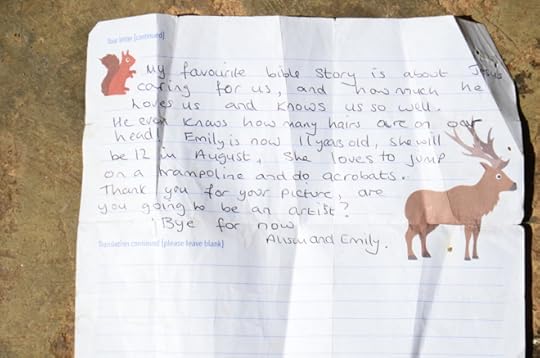Jeff Goins's Blog, page 70
March 18, 2014
You Have to Do This Before People Will Listen to You
This Family Guy video pretty much sums up the need we all have to be heard, not necessarily because we have anything to say but just because we’re human and want to be known.
Unfortunately, that’s the best way to get ignored.

Photo Credit: Paulgi via Compfight cc
How do you get people (other than your mom) to listen? How do you earn attention?
Everyone wants to believe what they’re doing is interesting and worth talking about. They want to think they’re special and unique. But the truth is that’s not your call.
I see this attitude most often exhibited amongst writers and artists. They think that just because they’re creative, the world owes them respect and attention.
Not true.
You don’t get to decide what “remarkable” is. Your audience does. [Tweet that]
And if nobody’s paying attention, you’ve got a problem.
Never worry about attention again
For years, I thought this way. As a blogger growing more frustrated by the minute that no one was listening to me, I failed to understand one essential concept:
Adding value.
I thought people would listen to me for my wit or humor. I thought they’d care about me, because I was interesting or a good writer or heck, I dunno, why can’t someone just love me for being me?
Here’s the truth: In a world full of noise, the way you get people to care about you is to care about them first.
No, we don’t care what you ate for breakfast or what stupid trick your cat can do — until you show interest in us. Once you’ve done that, you’ve earned our attention, and we may start to trust you.
Communication is a two-way relationship. It involves a sender and receiver and is held together by the glue of the message. Most writers don’t get this. They think of what they do as art, as something to be thrown into the ether, praying that it sticks.
But even art has an audience. Perhaps, especially so.
This doesn’t mean you have to pander to the masses or create mediocre work that contributes to the status quo. But you’d better find ways to add value. You better make it worth your audience’s while.
How I did this with my writing
When I began my blog, I knew sharing my random thoughts about inane things wasn’t enough to captivate and inspire. I knew nobody knew or cared about me (yet), and so I had to earn their attention.
So I started to think:
What problems do I have that others might have, too? How have I solved those problems?
What struggles have I overcome that I could share?
What interesting stories could I tell that would help people?
At first, I didn’t connect. In fact, it took months of trying different things before I found something that stuck: the topic of writing. Somehow, I’d overlooked the fact that for nearly a decade I’d been coaching writers in their craft.
So I began to share what I knew, what I’d learned, and what I was still learning. And immediately, people responded.
Whenever I blogged about writing (versus leadership or self-improvement), I saw a measurably better reaction (in terms of the number of comments, shares, or anyway I chose to measure it). I’d found my niche.
I decided to do a few things:
I started an email list, so that I could capture people’s attention for continued conversation.
I began guest posting on other blogs to build my audience even more.
I asked readers to share my articles (if they liked them) via social media.
From that point on, I continued searching for ways to help people, often asking questions and sharing thoughts along the way. The more this exchange happened, the more a community was established, and the better I got to know my readership.
This is what it means to add value: listen first, speak second.
Such an understanding didn’t come to me intuitively; I had to learn it through failure. But now I get it.
Our talents and skills are not intended only to be used for our own good. They’re meant to be shared as an offering to the world. A gift in the truest sense of the word.
Application: What you can do
If you have a message the world needs to hear — a book you want to write, a song you want to sing, or simply an idea worth spreading — the way you get others to care about it is to not just come out and share it.
First, you must engage, connect, and serve. Then people will listen. This doesn’t mean you can’t have convictions or that you need to wait for permission to speak.
It just means you appreciate the disruptive, media-driven nature of the world we all live in. And that you respect people’s time. After all, how many random strangers did you pay attention to today? (Get my drift?)
To break it down further, here’s what you can do:
Find a conversation. Spend some time listening to what people are already saying about a particular topic. Subscribe to a few blogs, read a couple of books by industry leaders. Get informed.
Engage with others. Leave comments on blogs. Not so people see your name, but just to help. Send emails to industry experts (my favorite way is to subscribe to their email list and reply directly to them). If you don’t know what to say, ask a thoughtful question that only takes a minute or two to reply to (Tim Ferriss is a pro at this — read his thoughts here).
Make a contribution. If you’ve studied your niche, then you know what it’s lacking. This should be something you feel strongly about, something that really bothers you. It could be a grave injustice or mere ignorance. But if you can’t find anything wrong or something new to contribute, then you have no right speaking up.
Repeat the process until people start listening. Then you can start a blog or host an event to continue the conversation. But don’t believe that just because you build it, they will come. You need to earn people’s attention — and the way you do that is by caring first.
So that when you eventually speak, they’ll listen. Why? Because they know you’re going to add value.
(Bonus application: Don’t waste your time leaving meaningless comments on random blogs. Instead, make a meaningful personal connection, take the relationship deeper by helping someone, and then say something that matters.)
Note: This was the second post in a three-part series on how to build a popular blog. Tomorrow, I’ll share the third part, which is about how building something that matters. If you don’t want to miss a thing, make sure you’re signed up for email updates.
What have you done to get people to listen to you? What questions or struggles do you still have? Share in the comments.

March 17, 2014
Success Starts with Passion: How to Build an Audience Doing What You Love
There is no passion to be found playing small – in settling for a life that is less than the one you are capable of living.
—Nelson Mandela
My writing journey began as a search for accolades and awards, recognition and fame. Instead, I found frustration and disillusionment, not realizing this search was actually keeping me from the very thing I sought.

Photo Credit: LeoLondon via Compfight cc
For years, I seethed with envy, watching other bloggers succeed while I stood still. As jealousy turned to resentment, I began to see the world through murky-colored glasses, finding fault with everything these people did.
And for awhile, this feeling consumed me. However, eventually I had to come to grips with reality: being jaded was doing me absolutely no good.
I didn’t become a better writer.
I didn’t become famous.
I didn’t get a book published.
After years of feeling this way, I decided to make a change: Instead of letting external factors dictate my success, I would focus on what I could control: my attitude.
Tip #1: Focus on passion, not results.
What this changed (eventually)
At first, nothing changed. I was doing my work, the same as I ever was. But internally, I was changing. Instead of a pay check or pat on the back, passion was now my most important metric.
If I showed up to write — for love, not accolades — then I had done my job. At least for that day, I’d succeeded. And tomorrow was another day.
This released me up from the pressure to perform, gave me greater artistic freedom, and made the work a lot more fun.
If nobody but me showed up to read my words, I would still write.
If I never won an award or got published, I would still write.
If I never earned a dime, I would still write.
Tip #2: Do your best work when nobody’s watching.
Isn’t it ironic?
Wait a second. I thought this was going to be a series on building a popular blog? Well, it is.
But there’s a paradox in the pursuit of fame: those who try the hardest to earn others’ attention rarely get it. Conversely, those who scorn the limelight are often the ones dodging the paparazzi.
Of course, this isn’t always the case. But with writing and other artistic crafts, I’ve found it to be undeniably accurate. Something interesting happens when you make passion your chief pursuit: People start to notice.
The world is desperate for, even envious of, people living purposeful lives that are free from fear. We are all inspired by those brave enough to shirk the trappings of fame and do work that matters.
What happens every time you see a film or read a book about some hero who risks it all to complete a quest that matters? You’re inspired. Captivated, even.
When I began to write for passion, at first nobody seemed to care. But I kept at it, kept doing the best work I could no matter how many (or how few) paid attention. And slowly over time, people took notice.
Why? Because there is something attractive about passion.
Tip #3: The less you care about your audience’s affections, the more your audience will be affected by your work. [Tweet]
Don’t do it for the money
I’ve talked to dozens of successful artists, authors, and entrepreneurs about why they do what they do. And they’ve all told me essentially the same thing: It’s not about the money.
Billionaire Donald Trump once said:
Money was never a big motivation for me, except as a way to keep score. The real excitement is playing the game.
If you’re setting out to master a craft, to play your own game, maybe you hope to some day become famous or rich. But if you were to dig a little deeper, you might find that such a goal isn’t what you’re really in search of.
Of course, there’s nothing inherently wrong with money or the acquisition of it. Nor is there anything immoral about wanting a large audience or a best-selling book. It’s just that those things aren’t enough to fulfill you.
Because what happens on the days when nobody shows up to read your words, watch your work, or experience your art? Do you still do your job? Not if it’s about the rewards.
Creativity is a process, not a product
Our work is more than what we do or make. It’s the entirety of effort that goes into each step of the process. In a sense, it’s what we don’t see.
So when you’re sweating and bleeding and loving every minute of it, remember: this is the reward.
What, do you do, then, when you create something you’re proud of and people don’t appreciate it? Do you quit? Give up because your work isn’t “relevant”?
Or do you push forward, remembering that history’s greatest artists were often misunderstood by contemporaries?
The most memorable creations are rarely comprehended by the masses — at first. This is what makes good art. It exceeds our expectations and sometimes offends our sensibilities.
Take heart, though. Some day, someone will get it. And they will be transformed. Until then, you must learn to love the work.
Tip #4: Respect the process, and results will come.
Isn’t it ironic?
You know, the Greeks didn’t write obituaries. They only asked one question after a man died: “Did he have passion?”
—Dean Kansky, Serendipity
When we set sail in search of our life’s work, this is what we must seek: passion. Not fame or rewards or riches, but a willingness to quietly do our work, trusting the sowing-and-reaping nature of life. Remembering that good things come in time if we do our jobs well.
So where does that leave us? Where, practically, can you go from here? Strive to do your work with gratitude and generosity. Because this part is not you paying your dues or delaying gratification until payday. This is the best it gets.
The grind is the reward. [Tweet]
And if you aren’t okay with that, then quit now. Because it’s only once you’ve mastered this mindset that you’ll have any shot at making it, at getting rich and famous.
What this meant for me was admitting that writing was my passion, something I couldn’t not do. And truth be told, when I was doing it for the wrong reasons, I knew it. Constantly anxious and uneasy, I wrote with apprehension. It felt unnatural.
Only when I surrendered to the work, did I find peace — and my audience. Maybe as you chase your passion, you’ll make a similar discovery.
Next steps
Now, wouldn’t it be frustrating if I left you lingering there? But I won’t do that. If you’re ready to take the next step, here’s what I recommend you do:
Change your mind. Make a decision to consciously reject negative and envious thoughts, admitting these thoughts do nothing to move you closer to your goals. Dedicate yourself to passion, not the rewards.
Commit to a practice schedule. Just for a week, set aside at least 30 minutes per day to work on your craft. You may share your work, but stay diligent to the discipline of writing for passion.
Create something people disagree with. No, don’t be contentious for the sake of being contentious. But write with conviction, in such a way that can’t help but offend at least a few. This is an exercise in disabusing ourselves of constantly chasing others’ approval. Pick a fight. It doesn’t matter if you win or lose. Just take note of the thrill you feel when letting go of that “what will people think?” worry.
After you’ve done those three things, take a breath and thank God for the opportunity to do something you love. And tomorrow, get up and do it all over again.
Note: This was the first post in a three-part series on how to build a popular blog. Next, I’ll share the next part, which is about how to get people to pay attention to you and listen to your message. If you don’t want to miss a thing, make sure you’re signed up for email updates.
What would truly chasing your passion look like for you? Share in the comments (include links to anything you write that’s inspired by this post).
March 15, 2014
Three Important Steps to Building a Killer Tribe
We’ve talked before about why you need to find your tribe — a unique group of fans, friends, and followers who resonate with your worldview.

Photo credit: Rachel D (Creative Commons)
This can be done through a blog, radio program, or speaking platform. But really, the medium is irrelevant; what matters most is the trust you establish with people.
The hard part isn’t defining the message; it’s creating a community of people who want to hear from you.
If you asked Seth Godin (the Godfather of tribe-building) how to build an audience, he’d say you need a message that is personal, relevant, and anticipated. I would agree. But what does that look like, practically?
Sometimes, it’s helpful to get rid of the jargon and just get down to the brass tacks. So here are three important steps to building a killer tribe (hat tip to Bryan Allain for coining the term killer tribe).
Step 1: Be as personal as you can be
If you want to reach other humans, act like one. Simple, right? Hardly.
A lot of people turn into robots when they get on the Internet or step into the spotlight. Either they become complete jerks or turn into formal ambassadors of snobbery.
You can be different:
Talk like a real person (even if it means breaking a few grammar rules).
Be accessible (as an exercise, try answering as many emails as possible as soon as they come in).
Show your scars (don’t be afraid to be a little vulnerable).
You don’t have to air all your dirty laundry or expose ever personal aspect of your life to accomplish this. Just don’t be someone you’re not. Be you and amazing stuff will happen.
I like what Chris Brogan has to say about this:
Your goal is to move your ideas through a platform to encourage a human interaction.
People like connecting with other people. It’s human nature. If you allow your fans and readers to feel comfortable, they’ll open up to you and start feeling comfortable. As they do, you’ll earn permission to speak into their lives.
Step 2: Stay relevant to your audience
People don’t care about what matters to you; they care about what matters to them. If you want to attract an audience, you need to stop thinking about yourself and start thinking about how you can help people.
Godin says it like this:
[W]hat people really want is the ability to connect to each other…
A tribe helps like-minded people find each other. It “gives them a story to tell and something to talk about.” So how do you build such a community intentionally? Here’s an idea: Be generous.
Consider the following:
A newbie blogger gives away an eBook he could charge money for in exchange for just an email address so that he can email you when he has another book come out.
An indie band offers a complimentary download of their new album for a week to start getting people talking about it so it can spread.
An up-and-coming cartoonist who’s yet to make the big-time releases a daily comic on his blog for all to see, with no strings attached.
Over-the-top generosity is the best marketing you’ll ever do. And nothing builds an audience faster than giving freely without expectation of compensation.
All of this, of course, is not free. It costs the creator something — a lot, actually. But in return, it earns her something even more valuable than money: trust. That’s what we’re going for here when we try to build a tribe. When help people get what they want, they’ll return the favor.
So how do you break that down? How do you become relevant in a world full of noise?
Find a niche with a worldview (or go create one).
Speak directly to just those people.
Exclude all others, focusing on only your tribe, thus making them feel special.
Do that enough, and you won’t be able to keep the fans away.
Step 3: Create mouth-watering anticipation
Every week, someone delivers a newspaper to my house.
I’ve never asked for it, never paid money for it, and never read it. Not once. Still, someone feels compelled to drop a little plastic bag full of today’s news on my driveway. And I promptly throw it in the trash.
The mindset of the person delivering the paper, I imagine, goes something like this:
If we show up often enough and interrupt you long enough, eventually you’ll have to pay attention. We will wear you down.
Wrong. This is called SPAM, and it doesn’t work. Not anymore.
If people aren’t anticipating your message, they’ll just tune you out. You have to earn permission, speak directly to a specific audience, and deliver what you promise.
Only then will we care about what you have to say.
You must show up when you say you will, do what you say you’re going to do, and always give people an easy way to leave the community whenever they want. That’s what permission — getting it and keeping it — is all about.
Contrast that newspaper I get with a recent book order from Amazon.com. I can’t wait for that package to arrive. It’s expected, and because of that anticipation, I take it seriously.
What this means for you
If you do the work of respecting people’s time, you earn the right to speak to them. You may find that some are no longer tuning you out, but showing up, eager to hear what you have to say.
And this is the paradox:
When you make your platform about other people, they’ll make it about you. [Tweet]
Respect begets respect. Generosity is reciprocated. Being helpful gets you noticed.
Honor these principles, and you’ll never have to worry about marketing or self-promotion again. You’ll be the kind of voice that people look forward to hearing from. You’ll have the audience you always wanted.
And if you need further help, check out my online course, which opens for registration next week.
Have you found your tribe yet? Share in the comments.

March 11, 2014
What War Taught Me About Writing
My watch hits 0100. Time to roll. I climb into my armored vehicle, lock and load my weapon, and order the convoy to move out.

Photo Credit: Hamed Saber via Compfight cc
In a few minutes, we pass through the gate and we’re officially outside the wire — no more barriers or guards to protect us.The enemy is very real and probably waiting for us.
This is the ever-present reality in a combat zone. The smallest error — make a wrong turn, drive too slow, drive too fast, fail to notice an unusual pile of trash on the road — could mean the difference between life and death. And I’m directly responsible for the lives of 30 people tonight.
For most, this is a reality they’ll never have to experience. For me, it was a Tuesday.
War and writing
I learned a lot of from my yearlong deployment, from dealing with uncertainty, to managing personnel and resources in chaos.
It wasn’t until I started writing that I realized the same lessons I learned in the impersonal, external combat zone in Iraq could be applied to the very personal, internal combat zone of creation.
As writers, we fight an internal creative battle daily. We do it not because it’s easy (it’s not), but because we seek to produce something worthwhile, impactful, and important.
In many ways, writing is war; the obstacles and setbacks are painful, the emotional hits can be brutal, and not everyone who starts finishes. Writing is uncertain, tough business. It’s not for everyone.
But if you’re willing to brave the fear, pain and uncertainty of creation, you can take comfort in knowing there are certain strategies and techniques that will help you succeed.
The following are the three most important lessons I learned from my wartime experience – lessons I continue to apply to my writing today. I hope they help you as much as they’ve helped me.
Nothing happens until you go outside the wire
In Iraq, I was a convoy security platoon leader. I was in charge of the safe and secure delivery of daily logistical resupply (think food, water and bullets) to our neighboring bases.
Outside the wire refers to everything outside of the confines and relative safety of the base. The moment you set foot outside the wire, you are in potentially enemy-controlled territory. This vulnerability, exposure and uncertainty is scary.
Nobody inherently wants to expose themselves to unknown danger, so no one inherently wants to go outside the wire. But we can’t resupply the neighboring bases without exposing ourselves.
In other words, we can’t support those who need us unless we go outside the wire. In a very real way, the safety and success of others depended on our willingness to be vulnerable and exposed on a daily basis.
When we publish our work, we’re exposed and vulnerable.
When you write and publish, whether it’s a blog post once a day or a book once a decade, you expose yourself to naysayers and critics. When you’re doing your best work, your most authentic work, it leaves you vulnerable.
But unless you write – unless you publish – those who need your work are left without your contribution to the world.
In a very real way, the people depending on your work need you to be vulnerable and exposed on a daily basis. Your job, as a writer, is to go outside the wire and publish your work.
Yes, it’s scary. It’s also necessary.
Success requires daily risk taking
Since my mission in Iraq involved exposure to danger daily, one would assume the likelihood of failure increased with every mission.
The opposite is true.
Every time my unit went outside the wire, we had the chance to refine our skills, learn the environment, and perfect our tactics, techniques and procedures.
Each day, we stretched our abilities to operate in a dangerous environment and became more adaptive to uncertainty. Through our daily risk taking, we increased the likelihood of mission success if something bad did happen.
Your success as a writer depends on your ability to take daily risk with your writing.
This means writing and publishing authentic, boundary-pushing, status-quo challenging stuff. There’s too much noise in the world – regurgitating material only increases the chance of your message getting lost in the noise.
Taking risk with your writing means pushing the limits of your own abilities daily, even if some people (naysayers and critics) don’t get it.
The truth is, these people will never get it, and sometimes they’ll even hate you for it. That’s okay. Your mission as a writer is to create your best work and impact the people who matter.
Like the neighboring bases waiting for resupply, the people that matter are the ones who are waiting for your message. Deliver something compelling, thought provoking, and unique, and you’ll get (and maintain) their attention.
Don’t worry about the naysayers, critics, whatever. Write for the people that matter.
Take risks daily: write and publish stuff that matters for the people who matter.
Remember why you do what you do
After many intense months of grinding it out in a warzone, it’s easy to lose track of your purpose.
Sure, the daily routine helps – with a strong routine you certainly won’t forget how to do what you have to do — but why you do what you have to do (your purpose) can get foggy.
When we’re in the trenches for a prolonged period of time with little rest and no time to recover, we lose focus. Pretty soon, each day bleeds into the next, we forget our goals, and what mattered weeks and months ago becomes meaningless — we’ve lost our purpose.
The most common mistake is to trying to find purpose through external validation; we work for an award, or praise, or bonus to validate our actions.
Of course, this doesn’t fix the problem. No matter how hard you try, you’ll never receive the award or decoration you truly earned, the praise you truly deserve, or enough money to justify the months and years of sweating and bleeding for your work.
So if you’re waiting for validation, to be picked, I’m sorry to say but you might be waiting for a long time.
Purpose must be personal, intrinsic, and immune to external influence.
Whether you’re going to war or going to write, your only chance of success is through an internal, incorruptible purpose.
Don’t write because you want the recognition of the tribe; write because you’re called to write. Don’t write because you want a pat on the back and an award; write because there is a story inside you that needs to be shared.
But most of all, don’t write because you care about the title of ‘published author’ – write because there is something inherently important about the message and impact of your writing.
So when things aren’t going your way, when you’re marred by setbacks and failure, before you throw in the towel, remember why you started writing in the first place. A powerful why can get you through even the most difficult times.
Winning the battle
Three simple but powerful lessons:
Go outside the wire and publish your work.
Take risks daily with your writing.
Remember why you do what you do.
Of course, like any other tips, techniques, or advice, these lessons alone won’t guarantee your success. Reading and understanding this material is the easy part – putting it to work is the hard part, and that’s on each individual writer. No amount of advice will help unless you put it to use.
So this is my final challenge to you: put these lessons to work in your life. And keep putting them to work every day of your life until you become the writer you’ve set out to become.
Good luck and keep creating.
Just for you guys, Tom’s giving away his new guide: The Combat Commanders Guide to Breaking Through Writer’s Block.
What have you learned from conflict? Share in the comments

March 4, 2014
The Biggest Lie We Believe About Influence
There is a lie many of us unwittingly believe. It creeps into our minds and lives in such a sneaky way we don’t even notice it. I tell it to myself every day; you probably do, too.

Photo credit: Thomas Hawk (Creative Commons)
It’s a subtle, seemingly harmless phrase that rings throughout my head all day long and attacks me when I doubt myself. It’s my excuse for not starting sooner.
It may tease and taunt you, too, causing you to think less of yourself.
And it sounds something like this…
“If only I had a platform…”
Then, I’d be able to broadcast my message.
Then, I’d say what needs to be said.
Then, I’d finally be able to make a real difference.
“All I need are resources,” the voice says. “Just a little more time or talent or attention. If people were watching me, I’d shine. I’d be a star.”
Yeah, right.
I’m calling “B.S.” on that. That voice is a liar; it’s your Enemy speaking, the lulling siren that tempts you to stall until a better, more convenient time to create comes. But here’s the truth:
Nobody who changed the world did it by waiting for an audience. [Tweet]
Not MLK. Not Gandhi or even Mother Teresa. And certainly not Jesus.
Yet, many of us are doing just that. We’re holding back, putting our art on pause, biding our time with mediocrity and waiting for someone to invites us onstage before we share our best work. What a cowardly way to live.
If this is you, if you’ve chosen to believe this lie, then let me tell you something: That day that you’re waiting for will never come. The day in which you will be discovered, the day when you finally get rewarded for your genius — it won’t happen. Not if you just keep waiting.
You will never have the attention you crave until you start living your future now.
Here’s how real difference makers live…
They don’t ask permission. They don’t wait to be picked. They just start with what they have. And you’re going to have to do the same if your art is going to matter.
Were you ever the last one picked for sports in school? I was… always.
A chubby kid who read too much and didn’t exercise enough, I was the one left standing against the wall when the dodge ball teams were chosen. The last one picked and the first one out. I hated that stupid sport.
Back then, I wasn’t in charge. I was living on someone else’s terms, having to conform to another system’s rules. I didn’t have a choice — I was a kid. But now things are different… if I choose to see them that way.
Not getting picked sucks. I know, it’s happened to me for most of my life. With girls, with friends, even with jobs. It’s a terribly disempowering feeling and truly a lonely way to live.
But here’s the good news: you don’t have to live like that any more. You’ve heard this before in various forms, but I’ll say it again for emphasis:
Those who change the world aren’t waiting for permission. They’d rather apologize for too much tenacity than regret having too much timidity.
You can do this with your writing or speaking or music, with whatever it is you do. Be bold, be daring — just don’t be a jerk. Because the world doesn’t need more dodge ball teams. What it needs is for you to get your act together and do something important. To share the work you’ve been called to create.
You, the artist
I use the words art and create a lot when I write. And if you aren’t a writer or a creative professional, you might get the wrong idea. You might think these words aren’t for you. And you’d be wrong.
The truth is you probably don’t think of yourself as creative as you truly are. How could you, in good conscience, don put yourself in the same company as Picasso and Neruda, even Beethoven? The audacity, the ego.
That’s what we think of when think of the term artist. Painters and poets and composers. But maybe we’ve been thinking about this all wrong.
Maybe, and I’m sincerely starting to believe this, art is anything you do that requires care and craft. So whatever you do, whether it’s painting or plumbing, you are an artist. Or at least, you can be, if you treat your occupation as art — a true vocation, a calling.
Because that’s what it is: your chance to let your voice be heard, to say something that changes the status quo, that pushes progress and moves humanity forward. To make something beautiful we can’t live without. Or not.
You could, of course, keep waiting to live the life you dreamed of, to share the words burning on your lips until a better time arrives. Until you’re ready. Until someone comes along and gives you permission to be yourself. That’s an option, too.
Are you doing that? Or are you believing the lie, waiting for permission? Share your story in the comments

February 25, 2014
Focusing on the Important Stuff in an Age of Distraction
In a world saturated with social media and unlimited interruptions, many of us struggle to focus on what’s in front of us. With so many voices vying for attention, it’s hard to know what’s worth our time.

Photo Credit: Βethan via Compfight cc
We end up tuning it all out, the good with the bad.
The surprising solution to our distraction confronts us every day. At the shopping mall. In long lines of traffic. Even standing at the coffeepot.
Every time we wait is an opportunity to slow down and be present in an increasingly noisy world, to listen to the voices we sometimes lose in the static.
And as we embrace the wait, we learn to appreciate the delays and postponements that teach us some things in life are worth waiting for.
Learning to slow down
Life was meant to be more than the daily humdrum. It was supposed to be enjoyable, full of purpose, not just stress and worry.
So where has all our satisfaction gone? Where is the pleasure, the joy?
We search for it on road trips and weekend getaways, even extended vacations in the Caribbean, dreaming of the life we’ve always wanted.
We seek out meaning in our jobs and other success pursuits. We even reserve feelings of joy and satisfaction for major events like marriage and parenthood.
But often we’re disappointed with what we find.
Sure, we may be happy, but we are far from complete. Even the best job, the best husband, and the best vacation have their flaws (I happen to know this for a fact).
What we were hoping for, what we dreamed would be a larger-than-life experience, ends up looking a lot like morning breath and spreadsheets.
So we keep searching, and we wonder why it’s becoming harder to sit still and just be. All the while, what we’re searching for sits in front of us, hidden in normal, everyday inconveniences.
If we reserve our joy only for the experiences of a lifetime, we may miss the life in the experience.
Such experiences are everywhere, waiting for us to see them. But first we must learn to open our eyes and recognize the gift of waiting.
Choosing to be grateful, anyway
In the in-between, that place where we spend most our lives, we learn to recognize the temporal nature of life. Eventually, all waiting must end.
And when it does, we are left with what we did with the time in between the beginning and the end.
Watching a tree grow will likely drive you crazy. It’s a boring process if you stand there, impatiently tapping your foot, waiting for it to do something.
But if you step away and come back later, you’ll be surprised to see something beautiful emerge. The fact is the plant is doing something; it’s growing. Just not as quickly as you might like.
Our culture has conditioned us to expect instant results and overnight success. But life doesn’t always work that way.
Our cultural impatience runs so rampant that we dress it up in terms like “productivity” and “efficiency.” But what’s really happening is we are conditioning ourselves to get what we want now, all the time.
Such a mindset robs us of the lessons waiting can teach us, causing us to miss out on the slow but important stuff of life.
How we grow
Most growth happens this way: slowly over time. You don’t even notice it.
In fact, sometimes the circumstances feel more like inconveniences than opportunities, but then one day you wake up, amazed at how far you’ve come.
When it comes to waiting — for anything, really — we have a choice:
we can try to bypass the delays to get immediate gratification,
or we can embrace the “long game” of life and invest those days, months, and years in the slow but intentional growth that leads to lasting change.
What would you rather do? Keep constantly searching for the next thrill or achievement to “complete” you? Or find a way to abide in where you are right now — this place that maybe, in its own little way, is perfect?
Three things that will make you happier now
If you struggle to focus, like I do, but want more out of life, try the following:
Make a gratitude list. Write down three things you’re grateful for today (science shows that such lists lead to increased happiness).
Stop competing. Instead of comparing yourself to someone you admire (or envy), consciously choose to celebrate their success. Jealousy leads to misery; make the effort to build others up, even when you don’t want to.
Resist the urge of distraction. The next time you’re tempted to “check in” on social media, to lose focus on what’s right in front of you, take a deep breath. Remind yourself that this moment won’t last forever and you should make the most of it.
For more help with focusing on what really matters, check out this five-part series with daily challenges to slow down.
You might also like my book, The In-Between, which you can pick up wherever fine books are sold (I’ve always wanted to say that). Audiobook aficionados can get it for free on Audible when signing up for a new account.
To get more of a taste of the book, listen to the whole introduction right here (or click the player below).
Do you struggle with distraction? How do you focus? Share in the comments.

February 21, 2014
5 Ways to Build a Powerful Email List
It’s one thing to understand the importance of email marketing — why you need to earn permission to communicate with an audience — and quite another to have a healthy list you’re consistently growing.

Photo Credit: gajman via Compfight cc
One of the best things I ever did as a blogger was build an email list.
My newsletter has been the most important asset to my online platform, helping me attract an audience, land three traditional book contracts, and build a business that let me quit my job and pursue my dream.
So, yeah… I kinda think email marketing is important. And you should, too. If you’re not getting people on your email list, you’re missing out big time.
The secret to building a powerful email list
What does it take to actually build an email list? You might have thought that all you needed was to get started with a Mailchimp or Aweber account and a form on your website. But that was just the beginning.
Let’s say you’ve done the work of setting up a list and getting those pesky forms embedded on your site. What now?
Next, you want to make sure website is ready to turn visitors into subscribers. Which means you need to design for readers, not yourself.
Your content is only as good as your ability to capture an audience’s attention.
Otherwise, you run the risk of having to keep reintroducing yourself to the same people over and over again. Which means you’ll never have permission to follow up — and that’s a problem.
What it means to get permission
Do you have something to say? A message to share? Something worth listening to? Then you need permission.
Everyone has a story, I believe that. But without an audience, how good is your message? What kind of impact will it have?
You may feel like you have something amazing to say, a word we all need to hear. And that’s great. But without getting people’s permission to communicate, your message won’t go far.
Without someone saying, “Here: I trust you; send me stuff,” you’re forced to throw stuff out there and hope some of it sticks.
The smart way to share a message is to get permission ahead of time so that when you speak, people listen. And how your website is designed is an important piece of the puzzle.
Questions to ask yourself:
Is it difficult for people to sign up for your newsletter?
How many clicks does it take to get to a place where they can give you their information?
How long does it take to even find a place to sign up?
You can’t assume people will search for ways to subscribe to your blog, that they’re dying to get more email in their inbox. They won’t and they aren’t. You have to make it easy.
Here’s how to get started
Use a feature box. Derek Halpern was one of the first people to popularize the big, fan email signup form on a blog. What he learned in doing this was that one of the best things you can do to get new subscribers is make it super obvious where people can sign up. (If you’re on WordPress, be sure you use a theme that has a feature box built in to it.)
Have multiple signup forms. Not only do you want to have a big signup box; you want to make it easy for people to sign up wherever they are on your site. For example, I include a signup form at the end of each article. Some sites include one in the footer or sidebar, as well. Wherever people are going, there should be an opportunity to join your list.
Leverage social proof. You can use a celebrity endorsement or share how many subscribers you have (e.g. “Join over 1000 daily readers!”). The idea behind social proof is that people want to be a part of what people are doing. But be careful that it doesn’t backfire on you (i.e. sharing a small number that prevents people from signing up).
Offer bait. Seth Godin calls it an “ethical bribe.” I like to think of it as a reward. However you view it, you want to incentivize people to join your email newsletter with an immediate signup bonus. When I did this with The Writer’s Manifesto , my subscribers grew from 75 to over 1000 — in a week!
Ask people to share. This is an obvious one, but most will overlook it. Once you’ve started getting subscribers, an easy way to grow your list is to ask existing followers to tell their friends. Inserting a tweetable link in a newsletter can work wonders. If you’re offering great content, your audience will be happy to share.
When in doubt, make it obvious, simple, and valuable for the reader. Reward people for their attention, never taking permission for granted, and don’t be afraid to occasionally ask them to share.
Do this, and your work will spread and your list will grow.
Did I lose you?
If this is too overwhelming and you don’t know where to start, I understand. This stuff can feel like Greek 401 if you’re just beginning with blogging and can’t wrap your mind around all the technical stuff.
If that’s you, start with a piece of bait. Find something useful you’ve already created (like a short eBook, blog series, or resource list) that you can quickly package and offer for free on your website.
For a thorough walk-through on how I did this, check out The Essential Guide to Writing an eBook & Sharing It.
Then ask people to share, using a tool like clicktotweet.com to automatically generate a message readers can easily post on your behalf (see how I’m doing that here).
And then watch the subscribers pour in.
This doesn’t have to feel sleazy
One of the things I often hear people say is, “But I’m not a marketer…” Or: “I don’t like self-promotion.” But that’s not what this is about.
Whether you consider yourself as a marketer or not, don’t forget this isn’t about you. It’s about your message, which deserves to be heard. Email, in my experience, just happens to be the best way to get it out there.
Having a strong email newsletter list will allow you engage with an audience, build trust over time, and lead people wherever you want to go.
For more on how to do this, check out this short video from my recent creativeLIVE class:
(By the way, if you missed the live broadcast of this, you can now get the whole course to watch whenever you want).
One last thing: Art is only as useful as the people it changes (tweet that). You have an opportunity to use the incredible tools that technology affords us to reach more people than you ever imagined. But you have to start.
Good luck, and here’s to your message spreading and your email list growing!
What questions about building an email newsletter list do you have? And what success stories do you have? Share in the comments.

February 19, 2014
The Very Best Way to Get Rejected Every Time
I’ve been on a confidence kick lately. From my experience as a freelancer, I’ve learned that it takes more than good content to become a published writer. You have to learn how to stand up to rejection.

Photo credit: Justin Taylor (Creative Commons)
When it comes to writing, you need a few things (other than talent) to succeed:
You need relationships.
You need connections.
You need to learn how to pitch.
When you’re getting started (at anything, really), you’re scared. You’re insecure. You don’t want to come off as some kind of arrogant jerk.
So what do you do? You say “no” for other people.
And this is absolutely the best way to get rejected.
Whether you’re applying for a job or asking someone out, you begin by assuming the answer is “no.” You lower your expectations. So that if the person does happen to say “yes” (which you know they won’t), you’re elated.
This is stupid and cowardly. But for some reason, we do it all the time. We shoot ourselves down before someone else can.
We call it humility. But really, it’s fear.
Fear makes us sabotage ourselves
We’re afraid of getting “shut down,” so we do it to ourselves. We do it so that someone else doesn’t have to. We begin with an apology or a you-don’t-have-to-clause. We say “no” long before we have to hear it.
That way, when the person does reject us, it’s no great disappointment. We were expecting it, after all. This is ludicrous, of course, but somehow we think we’re doing the person a favor by giving them an “out.”
Recently, I’ve received a number of requests for guest posts or getting together for coffee. Most have begun with a “You’re probably too busy” or “I know this won’t happen” statement.
I know why they’re doing this. They’re trying to take the pressure off, make it seem casual, like they don’t have too much vested in how I respond.
But I have to tell you: Such self-deprecation only makes me want to reject them even more.
I used to do this all the time, for no reason except that I was just plain “chicken.” But when I really started making big, audacious asks without apology or self-rejection, something strange happened. People said yes.
And I realized I didn’t need to say “no” for other people. That was their job.
A radical idea that could change everything
What if you did something crazy? What if you stopped asking and started inviting?
Imagine if you believed that about your work, that you actually saw it as an amazing opportunity you were letting someone else in on. What would that change for you?
And if you can’t think of your “ask” in terms of opportunities that people wouldn’t want to miss, then maybe you need to focus on doing more remarkable work.
If your work is less than amazing, you should be scared to ask.
But don’t let that stop you. Use the fear to make the art better, to make the work worth noticing. Whatever you do, stop rejecting yourself before others can, believe in the work you’re called to do, and invite others to join you.
What’s the worst that could happen?
They could say, “no.” That’s it. That’s as bad as it gets. Sounds a lot scarier in your head, doesn’t it? And it’s really not that bad of a word, once you get used to it: no.
I hear it every day. In fact, I got rejected last night after pitching a website on an idea they initially liked but decided not to use. After two weeks of radio silence, they shot me down.
You know what I did?
First, I felt sorry for myself and started whining to other writers, looking for affirmation. But do you know what that did? Nothing.
It didn’t make me feel better, didn’t change my situation. It only reinforced my own sense of inadequacy. So I decided to do something constructive: to rewrite that piece.
I used rejection as fuel and got back to work.
Rejections are reminders
In facing all kinds of failure, I’ve learned an important lesson, one that’s made me grateful for the rejection I still experience every day:
If you’re not getting rejected, you’re not in the game.
If you aren’t failing, you’re not trying. If aren’t getting turned down, you’re not asking. And if you aren’t risking, you’re not living.
Time and time again, we read that success comes from failure. Yet, in our own lives, we avoid it like the plague. We play it safe, never risking too much. And our souls shrivel in the shadow of mediocrity.
If we’re going to stay in the game, here’s what we need to do:
Stop avoiding failure.
Stop fearing rejection. (Better yet, face your fears and don’t let them dictate how you live your life.)
Put yourself out there every day.
Yes, you will get rejected. You will be turned down, shut down, or even fired. But every time, you will get stronger and better.
So remember that these rejections are reminders that what you’re doing is worth something. And that should be reason enough to keep going.
Do you say “no” for other people or reject yourself before they can? Share in the comments.

February 1, 2014
10 Things I’ll Never Forget About Uganda
Last night, I hopped a plane from Kampala to Mombasa, and now I’m blogging from my phone in the bush. It’s all part of my African adventure.
As I look back on the past whirlwind of a week, there are a few things I will never forget:
The private plane ride from Entebbe to Lira that threatened to remove every breath from my lungs during the flight.
The day I met my sponsor child and finally understood the significance of such a seemingly simple choice.
The beautiful, mile-long walk in the bush to fetch water.
Watching the girl who refused to crack a smile finally dance like there’s no tomorrow.
The man who stayed to take care of his family and the hope we saw in his eyes, in his house, and in his business.
The time a 20-member brass band welcomed my friends and me to the worst slum in Uganda with our very own parade.
The green rolling hills and the smells and colors of the country.
The time I met a former child soldier.
When I heard the most eloquent sermon ever delivered by a thirteen-year-old.
The moment I realized what this was all about and what my words were really worth.
Thank you for your prayers, your comments, and your concerns. And thank you to those who sponsored a child. You’ve made more of a difference than you realize. (By the way, my offer from the other day still stands.)
My journey continues in Kenya. I’ll share more soon. In the meantime, check out the rest of the team’s posts.
For those who have followed along, what was your favorite moment of the trip? Share in the comments.

January 30, 2014
The Worst Mistake You Don’t Know You’re Making
In high school, I had a teacher, Mrs. Kuntz, who was so tough on her students that we all feared failing her class. Never before had I worried so much about earning a passing grade, but her high standards made me wonder if I had what it took.

At the end of the semester, I wrote a book report and had to pull an all-nighter to finish it. The next day, I turned it in.
When she returned the marked-up version, my heart dropped into my stomach as I saw all the red marks. Furiously flipping through 15 paper-clipped pages, I arrived at the last one. There it was in bold, red ink:
95%. A.
The teacher who rarely gave out good grades and never offered empty praise gave me something special, something I was sure the other students didn’t get. And below the grade was a note:
You have a gift. Please consider a career as a journalist or professional writer.
Nobody had ever said anything like that to me. I still have the paper today. Words like that, affirming words from mentors and teachers and even strangers, make us into the people we become.
I’m embarrassed to admit this
There’s something strangely powerful about words. They can tell someone she matters or that you believe in her. They can also tear down and destroy, hurt and wound and make a person question himself.
There’s no denying it: words have weight. So why do we so often disregard their power?
For the past couple years, my wife and I have sponsored two children through two different child advocacy organizations. Every so often, we get a letter from one, which we read, stick on the refrigerator, and then quickly forget.
Apart from reading those letters and rarely responding, these kids have not been a part of our lives. I have never gone out of my way to tell them I believe in them or love them or think they’re special.
And I am so very ashamed of this.
Because today, I saw what those words can mean to a child.
When there’s no one to show you the way
In what’s called the worst slum in Uganda, we met a family today that I will never forget.

“I led a hard life,” the 25-year-old mother told us, lines on her face revealing an age that exceeds years. Sitting on her newly-swept concrete floor, Shaun and I heard a story we could barely believe.
Sarah grew up outside of Mbale, Uganda in a small village 140 kilometers from the capital. When she was very young, too young to remember, she lost both parents to AIDS, with only a grandmother to raise her.
By the time she was 12 or 13, her grandmother could not longer afford to support her. Hearing of jobs in the city, she stole some family money and took the bus to Kampala.

Once she arrived, she didn’t know what to do.
While she was staying in the park for “some time,” a woman approached her and told her about a way to earn money as a “street child.”
“Street child?” I asked.
“Prostitute,” the translator explained.
Oh. Right. Prostitute. At age twelve. Twelve years young. A prostitute. Wait, what? A prostitute? As in, paid for sex? At twelve? Yes, that’s the word.
“I had many men,” Sarah continued, “until I got one who agreed to stay with me.”
She ended up having four children with three different men, and the last claimed the baby wasn’t his, threatening to leave if she didn’t give him up.
Then Sarah met Judith, a woman from the nearby church who told her about Compassion and how she could keep the child. Without such intervention, she doesn’t think she would have survived.
“I would’ve died already… I had no parents, no one to advise me.”
“Tell them I love them”
Sarah started getting help with paying rent and providing food for her family and entered her oldest son, Dirisa, into the sponsorship program.
At age seven, he had started staying out on the streets at night, finding scraps to sell for food. This was her last resort.

The program is designed for at-risk children who wouldn’t otherwise be able to attend school, so Dirisa’s situation made him a good candidate (those are just a few of the selection criteria). Since joining the program, he’s now going to school, has learned to read and write, and no longer goes into the streets at night.
“I am happy, because I go to school and because I have friends,” he says.
I ask Dirisa if he knows who his sponsors are.
“Miss Allison and Emily from the U.K.,” he says without having to think about it.
Have they written him any letters?

Leaping to her feet, his mother rushes to where they keep such things, removing the letter from a backpack and handing it to me. I pass it to Dirisa. Would he read it?
In perfect English, he does, and out of his mouth comes words from another part of the world, words of love and encouragement. Words he probably has read over a dozen times.
These words hit me hard for some reason, tears welling up in my eyes. I turn to Shaun, and he has the same look on his face. We both know: This is a sacred moment.
“How do the letters make you feel?” I ask.
“I feel good… because very few of us get letters, so I feel very special.”
Thinking of my own sponsor children, I grimace, trying in vain to remember their names. I am so ashamed.
“What would you tell your sponsors if they were here right now?” Shaun asks.
“Tell them that I love them so much.”
What will you do with your words?
Sarah is sick. She has a terminal illness and has lost a lot of weight. Most days, it’s difficult to get around, much less do any work.

“Is there any hope?” she asks.
Always, I say. There is always hope with God.
When we offer to pray, she asks for a home, one she can afford that they won’t have to leave. She is looking for a safe place to die.
Pray for a place to leave my children when I leave this world.

Looking at Sarah, what I want to know is where were her words when she was 12? Who was there to tell her she could be more than a street girl? No one was.
The truth is there are millions of Sarahs in the world, and I don’t know how to help them all. But I do know how to write a letter, telling a little boy or girl they’re special. And that’s a start.

I don’t have much, but I do have words. We all do. And what we can do, what we must do, is share them.
“I tell people all the time that if you’re not going to write a letter, please don’t sponsor,” the former president of Compassion tells me.
I get it now. The money is insignficant compared to a letter that says, “I see you.”

Today in the slums, I saw what such words can do — in the hope-filled eyes of a boy whose smile could not be wiped away. And I read it in a note from a teacher so many years ago, and it made all the difference.
The part where I challenge you
This month, I offered a daily writing challenge to my readers, and this is the last day. So I want to do something special, whether you were a part of it or not. I want to issue a final call to action:
Write a letter today to someone who needs your encouragement.
This can be a note to your child, a memo to a colleague, even an email to a friend. Make it personal and meaningful and say what you’ve always wanted to say but didn’t. Maybe like me, you need to write one of your sponsored kids.

Or maybe you’ve been on the fence about child sponsorship all week, and now’s your chance. If so, I want to take a moment to talk directly to you.
I had no idea how important a simple letter was, especially to a child — until this trip. These kids keep the letters under their beds; they pray for their sponsors, thanking God for them.
Sponsorship is so much more than a monthly check. It’s about reaching out to someone somewhere in the world who feels forgotten and assuring them they’re not.
And now, thanks to this trip, I can tell you from personal experience that I trust Compassion. They’re doing a great job, maybe the best job, at helping rescue children from poverty. And it’s working — I’ve seen it.

So make your words matter. Give them away to someone who needs them today. Let them heal instead of hurt, and whatever you do, don’t make the mistake of taking them for granted.
You have no idea the impact that a few simple letters linked together in love can make. (Which reminds me: I’ve got some writing to do.)
Speak up for those who cannot speak for themselves, for the rights of all who are destitute.
—Proverbs 31:8
Read more posts from our blogging team:
What We Need When We Are Uncertain
Why Today Was Spectacular in an Ordinary Way
A Message from Pastor Amon to You
Letting Go of the Right Dream
The One Thing I’d Tell Mom
Note: Many of you have emailed me saying you’ve sponsored a new child with Compassion this week. I want to say thanks by giving you a free, signed copy of my new book, The In-Between. Just forward me your confirmation email at jeff at goinswriter dot com with a U.S. or Canadian mailing address, and I’ll drop the book in the mail. And for those who have yet to sponsor, if you do that this week, I’d be happy honor that for you, as well.
Will you take the writing challenge? What will you write and to whom? Share in the comments.








